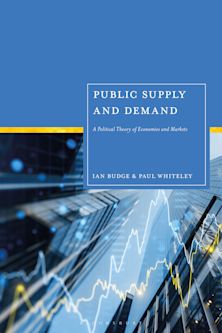- Home
- ACADEMIC
- Economics
- History and Theory of Economics
- Pride and Profit
Pride and Profit
The Intersection of Jane Austen and Adam Smith
Pride and Profit
The Intersection of Jane Austen and Adam Smith
You must sign in to add this item to your wishlist. Please sign in or create an account
Description
Jane Austen’s novels provide timeless insight into the practice of virtues and vices. They instruct their readers in rectitude and teach them that bad character inevitably leads to bad outcomes. Austen themes include the necessity of self-command, the importance of being “other directed”, the virtues of prudence, benevolence, and justice, as well as the follies of vanity, pride, greed, and the human tendency to misjudge oneself and others. Austen offers a no-nonsense moral philosophy of practical living that is quite similar to that of Scottish economist and philosopher Adam Smith. Smith’s book in moral philosophy The Theory of Moral Sentiments is a rich work that outlines how humans acquire and apply moral reasoning. It also provides a path to human happiness which emphasizes developing habits of virtue and propriety that direct and control individual ambition.
Pride and Profit explores the ways in which Austen’s novels reflect Smith’s ideas. More than this, they provide colorful illustrations of Smith’s ideas on self-command, prudence, benevolence, justice, and impartiality as well as vanity, pride, and greed. Jane Austen channels Adam Smith in her stories and characters, and more importantly, embellishes, refines, and explains Smith. Our understanding of Smith is improved and expanded by reading Jane Austen because she bring his insights to life and adds insights of her own. Bohanon and Vachris show how Smithian perspectives on virtue are depicted in Austen’s novels and how Smith’s and Austen’s perspectives reflect and define the bourgeoisie culture of the Enlightenment and industrial revolution.
Table of Contents
2 A General Introduction to Smith's Moral Theory
3 Virtues and Vices in Smith
4 Self-Command in Sense and Sensibility
5 Prudence, Benevolence, and Justice in Mansfield Park
6 Vanity in Persuasion
7 Pride in Pride and Prejudice
8 Greed and Promises in Northanger Abbey
9 Man of System and Impartial Spectator in Emma
10 Land Rents, Income, and Entails
11 Representation of Business in Smith and Austen: Adopting the Bourgeois Virtues
12 Social Rank in Smith and Austen
13 Reflections on the Intersection between Jane Austen and Adam Smith and its Relevance for Today
Product details
| Published | Dec 24 2015 |
|---|---|
| Format | Ebook (Epub & Mobi) |
| Edition | 1st |
| Extent | 202 |
| ISBN | 9780739191842 |
| Imprint | Lexington Books |
| Illustrations | 3 tables |
| Series | Capitalist Thought: Studies in Philosophy, Politics, and Economics |
| Publisher | Bloomsbury Publishing |
About the contributors
Reviews
-
What do Adam Smith and Jane Austen have in common? This tour de force ties the worlds of economics and literature together, leaving the reader delighted and informed along the way.
Tyler Cowen, Holbert L. Harris Chair of Economics at George Mason University and founder of Marginal Revolution
-
[Provides] important contect for Austen's fiction and analyzes ideas and texts with clarity and enthusiasm.
Jasna News
-
What do Adam Smith and Jane Austen have in common? This tour de force ties the worlds of economics and literature together, leaving the reader delighted and informed along the way.
Tyler Cowen, Holbert L. Harris Chair of Economics at George Mason University and founder of Marginal Revolution
-
With insight, wit, and sound judgment, Bohanon and Vachris not only show us the perhaps surprising degree to which Austen and Smith complement and enrich each other, but they also enhance and deepen our own understanding of human sociality. Perhaps we could not have known just how much a book like this needed writing, but now that Pride and Profit is here one has to wonder whether we truly understood Austen, Smith, or human sociality before.
James R. Otteson, Wake Forest University



































